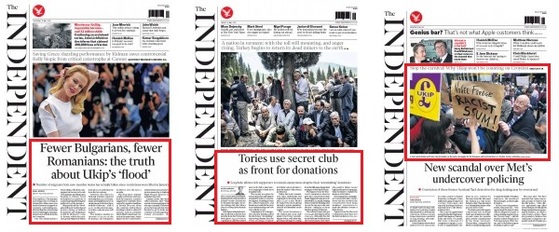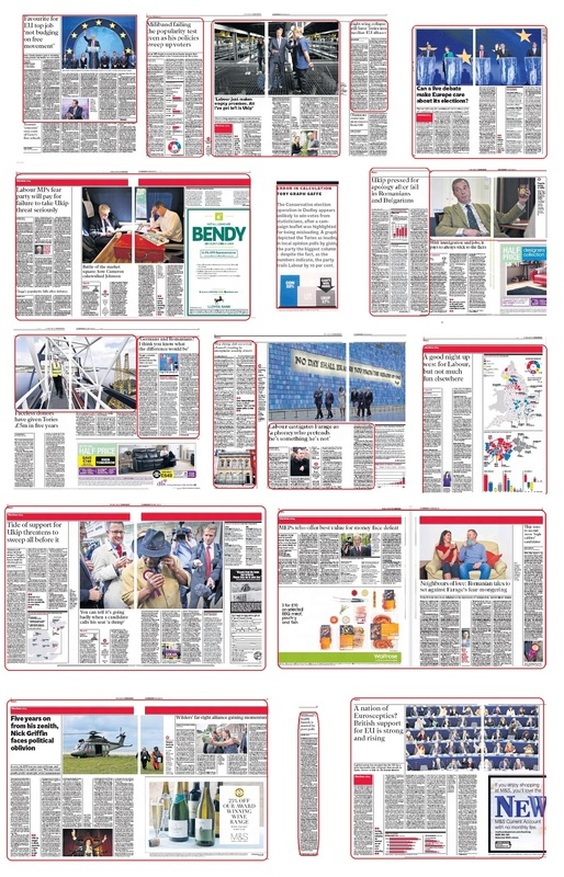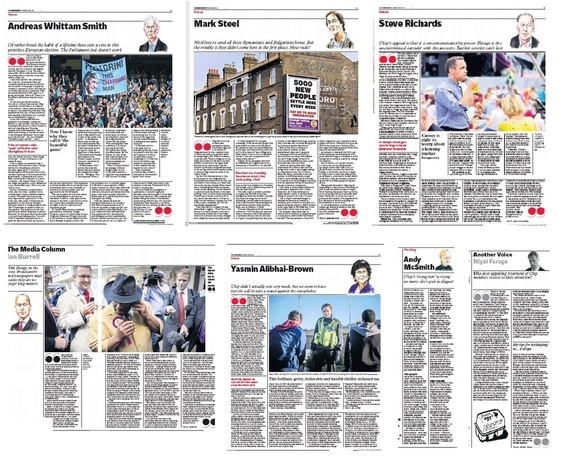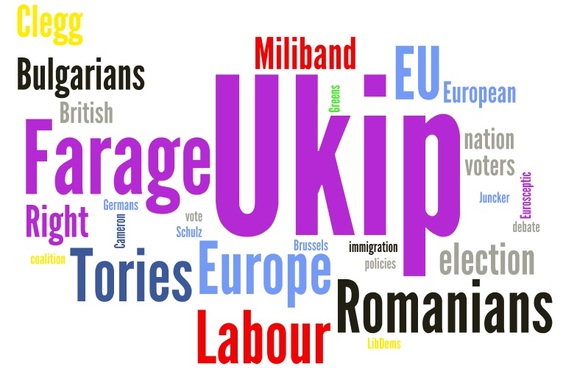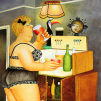The European elections auditHow the nationals covered the European and local campaigns from May 12-26
The Independent: front pages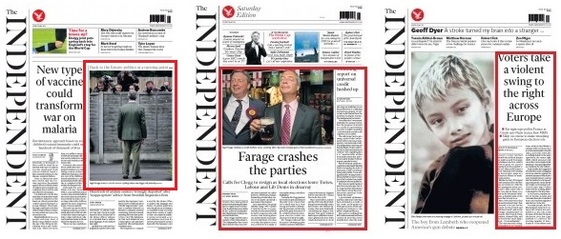
The elections featured on the Indie's front page six times, though the Tory donations story was more about a general election war chest than the local and European campaigns. Similarly, the figures about Romanians and Bulgarians were not specifically tied to the polls, but rival candidates used them as a stick to beat Ukip.
David Miliband's speech about the minimum wage made the splash on May 19, but this was a general election story and while it was delivered during the European campaign, there was no reference to the imminent vote. Inside pagesIn common with most other papers, the Independent's inside coverage was strongly focused on Ukip. There was some attempt to look at wider issues of Europe: two-thirds of a page was devoted to the choice of the next president of the European Commission, a global survey showed that as a nation we were Euro-friendly and there was some consideration of the future of the Conservatives' alliances at Strasbourg.
Coverage of the local elections was no less sparse than in other papers, but there were tantalising titbits, such as the faulty graph in a Tory leaflet distributed in Derby. On policy related to Europe or local councils the coverage was thin. Instead there was a retrospective on the fortunes of Nick Griffin and the BNP and an interview with some Romanian neighbours after Farage's LBC fiasco. There were vast across-the-gutter pictures of Cameron in Newcastle and Essex, but no copy to go with either. SubScribe has given the Indie the benefit of the doubt and included them in the audit, although the suspicion is that he was not in either place to talk about EU energy policy or dustbins. The photo count on the front and inside news pages was five of Farage, four of Farage, one of Miliband and one of Clegg. There were also three photographs of Cameron and Boris Johnson campaigning for the Newark by-election. Coverage of the Greens was limited to the top righthand corner of a spread on polling day. The opinion pagesThe Indie's commentators had far less to say about the elections and related topics than the other quality papers, with each of its big-name writers (who include Nigel Farage) turning to the subject only once in the final fortnight.
The paper did, however, carry four leaders with the final one on the eve of the poll urging voters to back candidates willing to engage in Europe - almost the same line as that taken by the Guardian. The cartoonists Dave Brown and Brian Adcock were inspired to pick up their pencils half a dozen times. The wordle**based on headline words
|
|
The European elections audit
How the Press covered the campaign and the aftermath Plus the papers' detailed breakdown The Telegraph in detail The Guardian in detail I am not going to vote in next week's elections...I have little idea who the candidates are. Only the Conservative party has communicated with me thus far...to discover just the bare names of the Labour Liberal Democrat and Ukip candidates, I would have to do a search of the internet. I detect here the habitual arrogance of professional politicians. They assume we would cast our ballots without even wanting to know what sort of people we are being asked to support. The Conservative pamphlet is an example of using one election to fight another. The front sheet is dominated by a picture of David Cameron, who isn't standing next Thursday
- Andreas Whittam Smith, May 15 With all this chaos looming over us, we need an outsider, an anti-establishment figure who's prepared to stand apart from the self-serving hierarchy that's in charge. This explains the rise of Nigel Farage, as there's no one more anti-establishment than a posh ex-stockbroker from rural Kent
- Mark Steel May 16 Farage is the nice bloke who has never been an MP, let alone a ruler. He alone is uncontaminated by power. He enjoys adulation similar to that conferred on Nick Clegg at the last general election but is even less constrained than Clegg was then. Farage happily disowns his party's policies, candidates and the rest if they are inconvenient to him. He is a leader unconstrained by politics - a dream scenario
- Steve Richards May 21 The Parliament is more powerful than most national legislatures. A vote for a candidate who promises properly to engage with it is a vote that recognises the inter-connected nature of progressive European society. That said, for many voters, the council election will have a more observable effect on day-to-day life. the temptation to use a vote to strike out at the Coalition or Labour's recent record should be resisted and the focus kept local. The time for a referendum on Messrs Cameron, Miliband and co awaits in 2015
- Leading article May 21 |
Please sign up for SubScribe updates
(no spam, no more than one every week or two)
|
|
|
